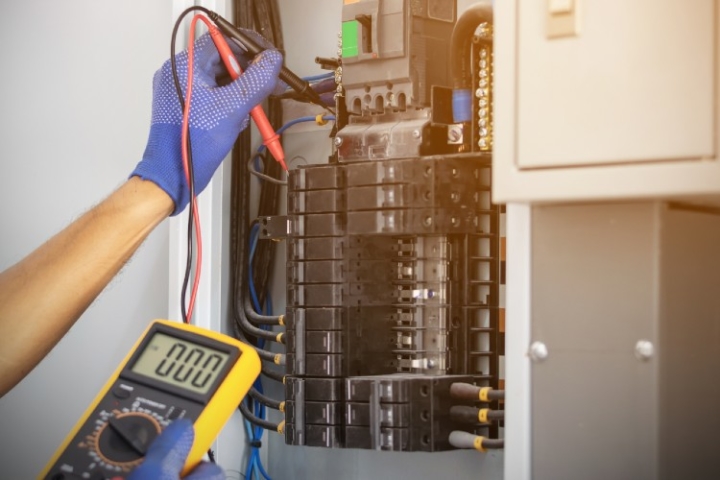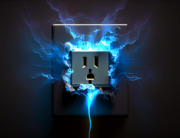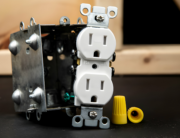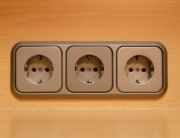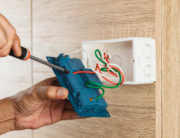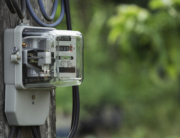Many homeowners ignore the precautionary measures that have been detailed in different governmental policies, for different electrical installations. There will be times when you will be boggled as to why the inspector has failed your electrical inspection. There are many reasons for a failed inspection, which are very common and generally ignored by the house owners.
To understand the various electrical loopholes that are left by contractors, it is extremely important and necessary to learn about electrical inspection in general.
What is an Electrical Inspection?
An electrical inspection refers to the thorough checkup of the electrical connections and wiring installed in your home.
Who is an Electrical Inspector?
An electrical inspector is an authorized person from the government and municipality who is responsible for checking the electrical connections to ensure they comply with the law codes and requirements in the area.
When Do You Need a Home Electrical Inspection?
There are a few times when you should get a home electrical inspection done. If you’re buying or selling a home, an inspection is a must. You’ll also want to get one done if your home is more than 40 years old or if you’ve had any major renovations done.
Apart from that having an electrical safety inspection is a good idea, when you get new electrical appliances or recently remodeled your home.
If you’re not sure whether or not you need an inspection, it’s always better to err on the side of caution. A professional electrician can take a look at your wiring and let you know if everything is up to code. They can also spot any potential problems that could cause issues
down the road.
Getting a home electrical inspection is relatively easy and painless. Most electricians will be able to do it in under an hour. And, it could save you a lot of money and hassle in the long run.
Why is Electrical Inspection Important?
There are many reasons behind the necessity of getting an electrical inspection done. Some of the most common ones are:
- Protection against possible surges: This is a common phenomenon in different regions, especially when there is a storm. Electrical surges can not only ruin your appliances, but can also create short circuits in your house. When the inspection is being done, the inspector will check for different points in the wiring that can cause this type of mishap.
- Fire: Many a times it has been seen that an electrical short circuit has been the reason behind a fire breakout in a house. These short circuits are caused by different loose wires in the meter or in the cabling itself. During the inspection, the inspector can easily recognize these faults and ask you to rectify them.
- Shocks: Imagine touching an electronic appliance and immediately experiencing a surging electric current in your body. Although the impact may not be that disastrous; however, this could lead to other mishaps easily. Apart from this, the body current in an electronic appliance can easily hamper its performance or can render it completely non-workable. An electrical inspector can catch these faults in the wiring in time to rectify them.
What is the Process of Electrical Inspection?
You may be wondering what the process of the electrical inspection entails. Here’s a look at what you can expect during an electric inspection.
There are two rounds of electrical safety inspection:
- Electrical Rough-in Inspection
The first is the electrical rough-in inspection, which is conducted after the wiring is installed but before the walls are closed up. During the electrical rough-in inspection, the inspector will check the following:- The size and type of wire used
- The condition of the electrical boxes
- The way the wiring is routed
- The connections between the wires and the boxes
- Electrical Final Inspection
The second round of inspection is the electrical final inspection. It is conducted after the walls are finished and all the electrical fixtures are in place. During the electrical final inspection, the inspector will check the following:
- The condition of the electrical outlets
- The condition of the switch plates
- The condition of the light fixtures
- The condition of the smoke detectors
- The functionality of the electrical system
If you’re getting your home’s electrical system inspected, you can expect the process to take a couple of hours. During that time, the inspector will go through your home room by room, checking all the electrical components.
Once the inspection is complete, you’ll be given a report that outlines any problems that were found and what needs to be done to fix them.
How Much Does an Electrical Inspection Cost for a Home?
An electrical inspection is a critical step in the home-buying process—but how much does it cost? It depends on several factors, but you can expect to pay between $100 and $500.
The electrical inspection cost varies depending on the size and age of the home, as well as the number of inspectors required.
If you’re buying an older home or one with complex electrical systems, you may need to hire two or more inspectors. The good news is that most home sellers are willing to cover the cost of an electrical inspection as part of the sale.
What Inspectors Look For During an Electrical Safety Inspection?
As a homeowner, you want to ensure that your electrical system is up to code and safe for your family. Here is a list of what inspectors look for during an electrical safety inspection.
- Proper Circuits – All circuits must be properly grounded and have the proper gauge wire to handle the load.
- GFCI and AFCI Circuit Protection – These are required in all damp locations to prevent electrocution.
- Electrical Boxes – All electrical boxes must be properly installed and secured.
- Box Heights – Electrical boxes must be installed at the proper height to prevent damage.
- Cables and Wires – All cables and wires must be properly installed and secured.
- Cable Anchoring – All cables must be properly anchored to prevent them from becoming loose.
- Wire labeling – All wires must be properly labeled to prevent confusion.
- Surge Protection – Surge protectors must be installed on all circuit breakers to prevent damage from power surges.
What Are the Most Common Home Electrical Issues?
It’s no secret that electrical problems are one of the most common home maintenance issues. While some electrical and wiring issues are simply annoying, others can be downright dangerous.
That’s why it’s important to get an electrical inspection periodically. Some of the most common home electrical issues are as follows:-
- Exposed Wires
- Spliced Wires
- Ungrounded Outlets
- Painted Outlets
- Double-Tapped Circuit Breakers
- Reversed Polarity
- Improperly Modified Electrical Panels
- Missing Knockouts in Electrical Panels
- Aluminum Wiring
- Defective Breaker Panels
- Absence of Ground Fault Circuit Interrupters (GCFIs)
How to Prevent Different Problems during Electrical Inspection?
Your mind just might be full of questions as to why you failed an electrical inspection. While the reasons may vary, it is always better to know what to do before an inspection to avoid failure. Some of the main points are:
- Research: Check all the possible norms and procedures that you might need to follow while installing different wires and cables. Apart from this, a proper research will also help in ensuring that you do not stand clueless, while the inspector does the inspection.
- Proper equipment: The electric wires and cables in your house should be authentic in nature. They should be made as per the norms and requirements of the state laws.
- The right technician: It is imperative that you get the right electrical technician to work in your house. A novice or amateur might just damage the electrical connections that could lead to different types of disasters, apart from you failing the inspection.
- The costs involved: It is advisable to check the charges involved in getting an inspection done. While some places will not charge you at all, some others may charge, especially if it is a repeat visit. You would also need to know the necessary paperwork you would need before and during the inspection. Getting the paperwork done beforehand will help save a lot of time.
Electrical inspection is a must for every household to ensure the safety and security of the habitants. In fact, it is required, but it most certainly does not need to be a cause for high blood pressure. Knowing what to expect beforehand can be one of the best ways of dealing with an electrical inspection. If you have the loopholes rectified as per the requirements of the state, then there is no way you will fail the inspection.

D&F Liquidators has been serving the electrical construction materials needs for more than 30 years. It is an international clearinghouse, with 180,000 square facility located in Hayward, California. It keeps an extensive inventory of electrical connectors, conduit fitting, circuit breakers, junction boxes, wire cable, safety switches etc. It procures its electrical materials supplies from top-notch companies across the globe. The Company also keeps an extensive inventory of electrical explosion proof products and modern electrical lighting solutions. As it buys materials in bulk, D&F is in a unique position to offer a competitive pricing structure. Besides, it is able to meet the most discerning demands and ship material on the same day.
